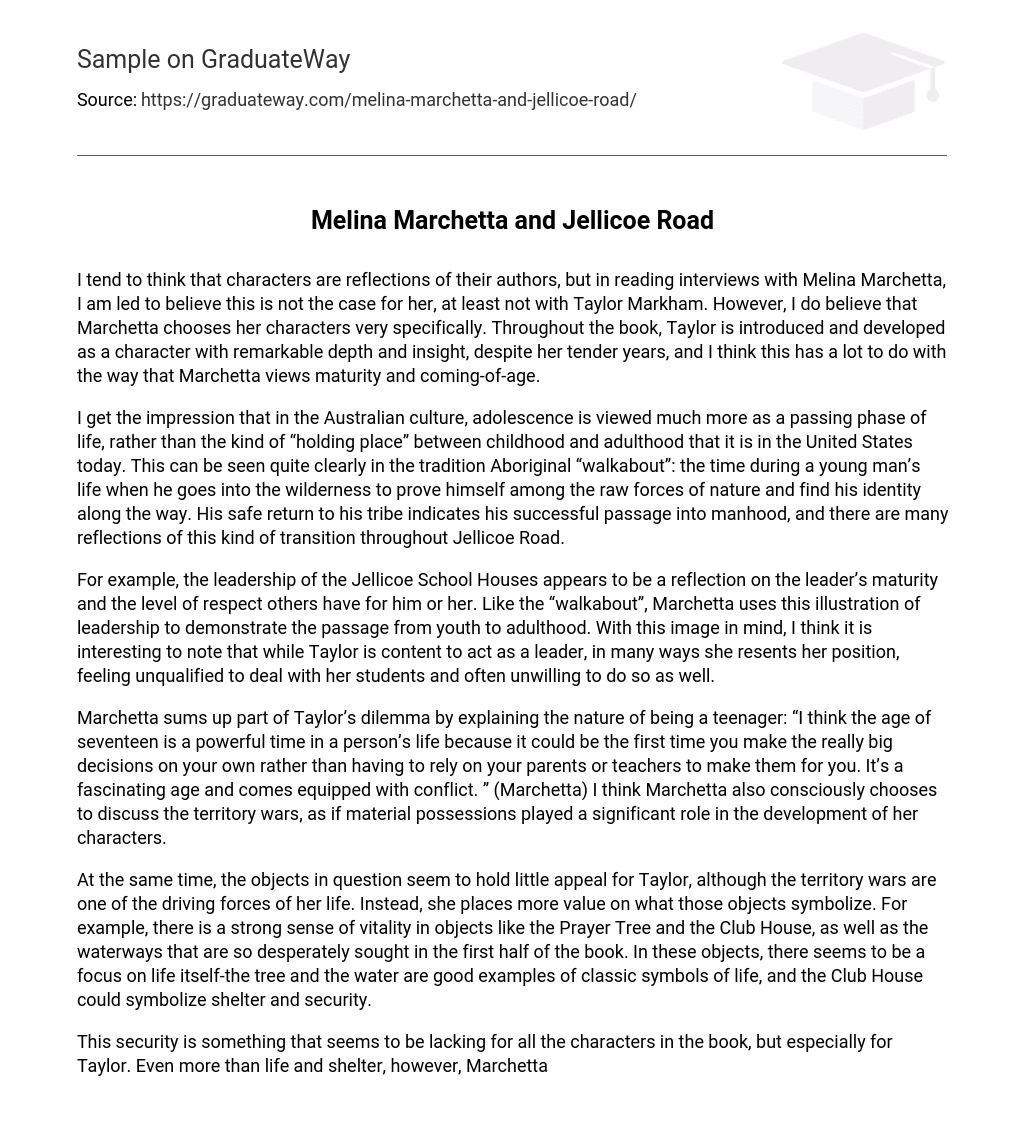After reading interviews with Melina Marchetta, my perspective on characters as reflections of their authors has changed. While Marchetta does not see herself reflected in Taylor Markham’s character, I still believe she chooses her characters carefully. In the book, Taylor is portrayed with remarkable depth and understanding despite her youth. This can be attributed to Marchetta’s distinct perception of maturity and the transition into adulthood.
In Australian culture, adolescence is considered a temporary stage of life, in contrast to the United States where it is regarded as a transitional phase between childhood and adulthood. The Aboriginal “walkabout” ritual exemplifies this perspective, as young men venture into the wilderness to discover themselves and establish their identity. Successfully returning to their tribe indicates their journey into manhood. Jellicoe Road also portrays similar transformative experiences.
To give an example, the leadership in the Jellicoe School Houses seems to reflect the leader’s maturity and how much respect others have for them. Marchetta uses this portrayal of leadership, similar to the “walkabout”, to show the transition from youth to adulthood. Considering this image, it is noteworthy that Taylor, though comfortable with being a leader, has mixed feelings about her role. She feels unqualified and often unwilling to handle her students.
Marchetta summarises Taylor’s predicament by describing the teenage years as a crucial period in one’s life where significant decisions are made independently, without relying on parents or teachers. She believes that being seventeen is both captivating and conflict-ridden. Additionally, Marchetta deliberately incorporates discussions on territorial disputes, suggesting that material possessions significantly influence the development of her characters.
While the territorial conflicts are important to Taylor, she does not find much interest in the objects involved. Rather, she attributes value to the symbolism they represent. The Prayer Tree, the Club House, and the sought-after waterways all exude vitality. These objects signify life itself; the tree and water are traditional symbols of life, while the Club House may symbolize protection and safety.
The book portrays a lack of security for all its characters, particularly Taylor. Marchetta emphasizes that Taylor’s desire for trust supersedes her need for basic necessities like life and shelter. According to the author, Taylor’s trust is first shattered at the age of 11 when her mother abandons her on Jellicoe Road. It is further broken when she is 14 and Jonah prevents her from reaching her mother during their initial escape attempt.
She lacks trust in Hannah due to Hannah’s habit of withholding information and disappearing. On the other hand, she takes her trust in Raffy and Ben for granted. Throughout the story, however, she learns to trust again, with Raffy and Ben being the ones who initiate this process. This connection made by the author was refreshing for me as it is uncommon to come across a character who isn’t materialistic. Taylor, the protagonist, doesn’t express any deep emotions or attachment towards her possessions. Instead, she prioritizes her relationships.
Marchetta’s authorship and Taylor’s character are connected in an intriguing way through the relationship between Taylor and Jonah. During Marchetta’s interviews, she often mentions experiences that she has never had, such as finishing high school. This raises the question of whether Taylor’s relationship with Jonah is somehow vicarious. It is worth noting that Marchetta is unmarried, and it is possible that her single status influences her writing.
When analyzing Jonah Griggs, he possesses qualities that make him appealing to many girls: he is tall, strong, handsome, and intelligent. In the words of Marchetta, “it’s like he hovers over me, which is strange because I’ve always been at eye-level with the boys around here” (186). These physical attributes alone attract attention, leading me to speculate if Marchetta harbors some envy towards Taylor for being loved by Jonah. Marchetta admits to shedding tears during the conclusion of Jellicoe Road, showcasing her deep connection to both the story and its characters.
Upon closer examination, the connection between the reader and the text may go beyond what was initially perceived. Despite Melina Marchetta’s remarkable ability to vividly depict Jellicoe Road, there may not be a significant direct correlation between Marchetta and her characters. Nevertheless, it is evident that Marchetta has a profound personal involvement when immersing herself in her own novel. As readers, it is only logical for us to partake in her experiences.





